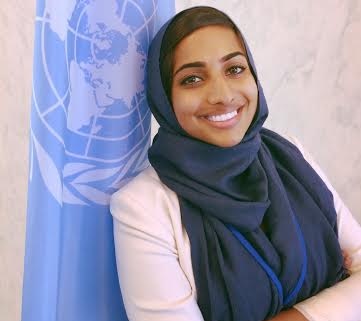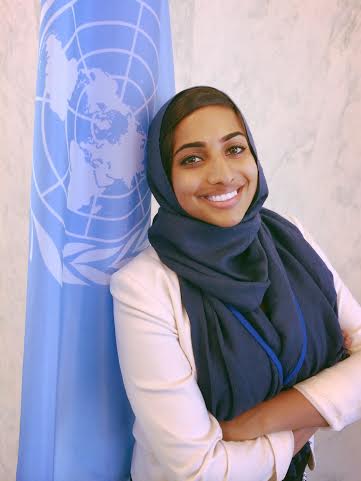Sara Rahim: champion for interfaith dialogue
By Rose Foran
When Sara Rahim recounts the details of her past accomplishments, it is with a breezy, cheerful tone. This is at once disarming and refreshing, given that they are long and of the highest caliber, especially for a person so young: the twenty-three-year old’s résumé is peppered with accolades from the State Department, the United Nations, and the White House, to name a few.
But for someone who thinks so globally, who speaks a laundry list of languages, her recipe for changing the world, Rahim says, starts simply: with sharing a meal, or starting a conversation.
It is this attitude that propelled her to the UN stage on February 6, 2015 as the youth keynote speaker for World Interfaith Harmony Week. Rahim has served as the Youth Representative of the Parliament of the World’s Religions for a year, one of the oldest interfaith organizations in the world.
Her words were poignant, provocative in their self-evidence, and inspired by champions for peace and cross-cultural understanding: King, Mandela, Gandhi.
“Too often, religion is misused as an instrument for division and injustice, betraying the very ideals and teachings that lie at the heart of each of the world’s great traditions,” Rahim stated to a hall of dignitaries. “However, at their best, religious and spiritual traditions shape the lives of billions of people in wise and wonderful ways. When our diverse communities work in harmony for the common good, there is hope that the world can be transformed.”
Her remarks reflect the mission that Rahim indeed lives and breathes: interfaith dialogue. It is something that permeates the conversation, albeit not in the carefully placed, studied way a politician might insert watchwords or lofty ideals. She is earnest, focused, and highly introspective. Rahim wants to change the world, and it seems as if she knows exactly how to do it.
“When you look at issues related to multi-culturalism,” Rahim mused, “I think a lot of people think of it at a very macro level or policy level. It’s as simple as breaking it down to human-to-human interaction.”
Born and raised in Chicago to an immigrant Pakistani family, Sara Rahim began what would be a defining mission in sparking and sustaining interfaith dialogue as a teen. She became active in advocacy work for the Muslim community in high school and found herself at ease publicly explaining her faith to her peers, through a series of what she calls “Islam 101” talks.
“My faith is a big part of my advocacy,” Rahim said. “When I look at my faith and identity, I learn to voice my values, and that means as an individual I’m learning to identify what calls me to action.”
Her mission and drive got her noticed by the State Department, which funded a scholarship for Rahim to travel to Cairo, Egypt to study Arabic. It was an eye-opening experience for her, having never experienced the Arab Muslim world, and Rahim said it brought a new depth to her understanding of what it means to be an intercultural ambassador.
“During my time in Egypt, I didn’t speak Arabic as a Muslim,” she said. “Not speaking Arabic, I definitely had a shared religious identity with the Egyptian community, but for me, it was something as simple as looking for that shared humanity and trying to build those bridges with the community.”
During that summer in Cairo, Rahim witnessed Coptic Christians worshiping and living peacefully next to Muslims. “At that time,” she recalled, “the Arab spring had just begun, and it was during a time of civil unrest, but it was the perfect example of multi-religious communities living together.”
Not being able to fully integrate with the Arab-speaking community, despite her Muslim faith, magnified the importance of Rahim seeing interfaith cooperation on a basic, human level, especially when the Arab world was reaching a critical juncture.
Her time in Cairo motivated her even further to expand her advocacy work and solidify her position as a true interfaith ambassador: while pursuing her undergraduate degree at Saint Louis University (A Catholic school), she decided to expand her reach beyond advocacy work within the Muslim community. She began working for the White House Interfaith Challenge, President Obama’s call to action for college campuses across the country to commit to interfaith service.
It wasn’t long before Rahim found herself back in the Arab world – this time in Morocco, through an SIT (School for International Training) Study Abroad program, which focused on migration issues in North Africa. The experience sparked the same inner conflict Rahim had felt in Egypt two years earlier: “It was an identity crisis,” she said.
“I found myself at odds – being a Pakistani American Muslim woman – being in Morocco at that time. I wear a headscarf, so it was something as simple as people identifying me as Indian. For me, it was like no, I’m Pakistani-American. I’m also American. I was almost being addressed as an immigrant in Morocco. It helped to understand how sub-Saharan migrants were being addressed and perceived in Morocco.”
While in Morocco, Rahim saw many sub-Saharan migrants who came to the North African country in hopes of making it to Europe. On the heels of the Arab Spring, Rahim said, “Morocco was in a unique place. There was such an influx of identities there, in terms of their Arabic influence, how they’re part of Africa, and seeing the European influence, too.”
She became more aware of refugee migration issues, and the need for what she said was, “as simple as a cross-cultural dialogue,” between the sub-Saharan migrants and the Moroccan community.
“I identified with them,” she continued. “It made me understand the complexity of identity in terms of language and culture, faith and ethnicity. It helped me realize the intersectionality of these issues and the need for dialogue and breaking down those barriers.”
Rahim rode the momentum she gained in Morocco, and sought to bring her new awareness and passion for issues regarding immigration back home to Chicago. After having experienced first-hand how a language barrier can compound the myriad issues and difficulties immigrants can face in a new host country, she defined her new mission: helping Iraqi refugees settle in the United States.
“How I was perceived in Morocco made me sympathize with the immigrant experience. And then coming back to the US, I realized something as simple as a language barrier can prevent you from accessing resources that are essential to you,” she said.
Rahim partnered with World Relief, a Christian organization that provides resettlement services to refugee communities. Through World Relief, Rahim not only provided services to new refugees, but also trained the organization’s staff on better practices with working with Muslim communities and with the Iraqi refugee community. She secured a grant with the State Department that provided funding to translate refugee resettlement resources, so they could be more transparent to the community.
“It was a very productive summer,” she said, smiling.
When asked about what paths she sees herself taking in her future, Rahim seemed to be at a loss, for the first time in this conversation about wide-reaching issues and the drive and passion that has taken her across the globe. “I can’t see issue areas in isolation,” she said, which was unsurprising for a person who has made a career out of connecting people, communities, and existential ideals.
“I’m very passionate about advocacy,” she said. “I’m passionate about global health. I’m passionate about refugee and migration issues, and communities in conflict.”
“I see interreligious work in any part of what I plan to do, whether that’s in policy or grassroots advocacy work. I see myself doing both. But at the end of the day, I’m passionate about immersing myself in communities and really trying to bridge those gaps at a basic level.”
17-12















2015
2,707 views
views
0
comments